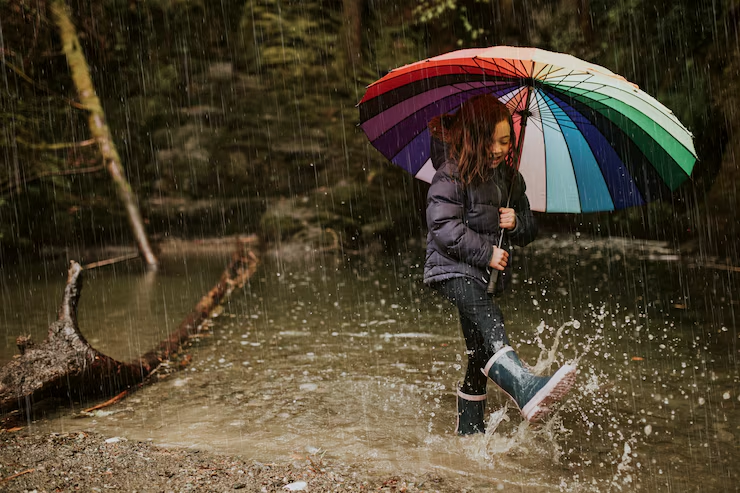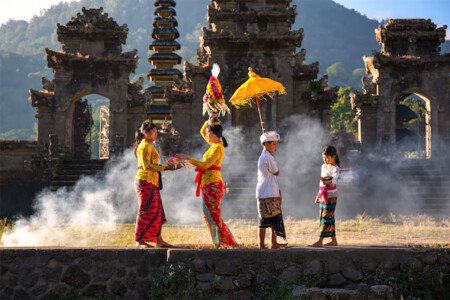Bali, the enchanting Island of the Gods, beckons travelers year-round with its mystical temples, emerald rice terraces, pristine beaches, and vibrant culture. However, timing your visit can make the difference between a good trip and an extraordinary one. Understanding Bali’s weather patterns and festival calendar will help you maximize your experience on this tropical paradise.
🌦️ Understanding Bali’s Climate
Bali enjoys a tropical climate characterized by two distinct seasons: the dry season and the wet season. Located just eight degrees south of the equator, the island maintains warm temperatures throughout the year, with minimal variation between seasons.
Temperature Consistency
Average temperatures in Bali range from 26°C to 28°C (79°F to 82°F) year-round, with coastal areas remaining slightly warmer than the mountainous regions. The highland areas like Ubud and Bedugul can be cooler, especially during evenings, with temperatures dropping to around 20°C (68°F).
Humidity Levels
Humidity typically ranges from 70% to 85%, creating that characteristic tropical atmosphere. The ocean breeze provides natural cooling, particularly in coastal areas like Seminyak, Kuta, and Sanur.
☀️ The Dry Season: April to October
The dry season represents Bali’s peak tourist period, and for good reason. This period offers the most favorable weather conditions for outdoor activities and sightseeing.
Weather Characteristics
- Rainfall: Minimal precipitation, with occasional brief showers
- Sunshine: 8-9 hours of sunshine daily
- Humidity: Lower humidity levels compared to wet season
- Ocean conditions: Calmer seas, perfect for water activities
Monthly Breakdown
April – May: The shoulder season offers excellent weather with fewer crowds. Temperatures are comfortable, rainfall is minimal, and accommodation prices are more reasonable.
June – August: Peak dry season with the least rainfall. This period coincides with European and American summer holidays, resulting in higher prices and larger crowds.
September – October: Another excellent shoulder period with fantastic weather and diminishing tourist numbers.
Activities and Advantages
- Perfect for temple hopping and cultural exploration
- Ideal surfing conditions on the west coast
- Excellent visibility for diving and snorkeling
- Optimal conditions for volcano trekking
- Best time for photography with clear skies
🌧️ The Wet Season: November to March
Don’t let the term “wet season” discourage you. Bali’s rainy season has its own unique charm and advantages that many travelers overlook.
Weather Patterns
The wet season doesn’t mean constant rain. Typically, you’ll experience:
- Short, intense afternoon or evening downpours
- Clear, sunny mornings
- Higher humidity but lush, green landscapes
- Occasional longer rainy periods
Monthly Breakdown
November – December: Transition period with increasing rainfall but still plenty of sunshine. Great for avoiding crowds while enjoying decent weather.
January – February: Peak wet season with the highest rainfall. However, rain usually comes in short bursts, leaving plenty of time for activities.
March: Weather begins improving as the dry season approaches, offering a good balance of fewer crowds and improving conditions.
Hidden Advantages
- Dramatically lower accommodation and flight prices
- Fewer tourists mean more authentic experiences
- Lush, vibrant landscapes perfect for nature photography
- Better rates for activities and tours
- Romantic atmosphere with dramatic skies
🎭 Bali’s Festival Calendar: Cultural Immersion Opportunities
Bali’s Hindu calendar is packed with colorful festivals and ceremonies that offer visitors incredible cultural experiences. Planning your visit around these events can provide unforgettable memories.
Major Annual Festivals
Nyepi (Balinese New Year) – March/April
The most significant celebration in Bali, Nyepi is a day of silence, reflection, and meditation. The day before features the spectacular Ogoh-Ogoh parade with giant demon statues.
What to expect:
- Complete island shutdown for 24 hours
- No flights, transportation, or activities
- Unique opportunity to experience traditional meditation
- Incredible night sky visibility due to no artificial lights
Galungan and Kuningan – Every 210 days
This 10-day festival celebrates the victory of good over evil. Villages are decorated with beautiful penjor (bamboo decorations), and families gather for elaborate ceremonies.
Highlights:
- Stunning village decorations
- Traditional ceremonies at family temples
- Special traditional foods and offerings
- Authentic cultural immersion
Bali Arts Festival – June/July
A month-long celebration showcasing traditional and contemporary Balinese arts, dance, and music.
Features:
- Traditional dance performances
- Art exhibitions
- Cultural workshops
- Music concerts
Regional Festivals and Ceremonies
Melasti Ceremony – Before Nyepi
A purification ritual where thousands of Balinese dressed in white process to the sea or sacred water sources.
Waisak Day – May
Buddhist celebration at Borobudur-style temples, particularly beautiful at Brahma Vihara Arama in North Bali.
Independence Day – August 17th
Indonesian national holiday featuring parades, traditional games, and patriotic celebrations.
📅 Month-by-Month Guide
January
- Weather: Wet season peak, frequent afternoon showers
- Crowds: Low tourist numbers
- Prices: Lowest accommodation rates
- Highlights: Lush landscapes, fewer crowds at attractions
February
- Weather: Continued wet season with heavy rainfall periods
- Crowds: Still low season
- Prices: Great deals on everything
- Highlights: Valentine’s Day romance, authentic local experiences
March
- Weather: Transitioning to dry season, improving conditions
- Crowds: Beginning to increase
- Prices: Still reasonable
- Highlights: Nyepi celebrations, beautiful weather emerging
April
- Weather: Excellent – dry season begins
- Crowds: Moderate
- Prices: Mid-range
- Highlights: Perfect weather, Easter holidays, shoulder season benefits
May
- Weather: Fantastic dry season conditions
- Crowds: Moderate, pre-peak season
- Prices: Increasing but still reasonable
- Highlights: Ideal conditions for all activities
June
- Weather: Peak dry season begins
- Crowds: High – European summer holidays begin
- Prices: High season rates
- Highlights: Bali Arts Festival, perfect weather
July
- Weather: Excellent dry conditions
- Crowds: Peak tourist season
- Prices: Highest of the year
- Highlights: Continued Arts Festival, ideal surfing
August
- Weather: Driest month of the year
- Crowds: Peak season continues
- Prices: Very high
- Highlights: Independence Day celebrations, perfect conditions
September
- Weather: Still excellent dry season
- Crowds: Beginning to decrease
- Prices: Starting to moderate
- Highlights: Shoulder season benefits returning
October
- Weather: End of dry season, still great conditions
- Crowds: Moderate levels
- Prices: More reasonable
- Highlights: Last of the dry season, good value
November
- Weather: Wet season begins, occasional showers
- Crowds: Low season returns
- Prices: Dropping significantly
- Highlights: Fewer tourists, lush landscapes returning
December
- Weather: Increasing rainfall
- Crowds: Holiday rush begins mid-month
- Prices: High during Christmas/New Year
- Highlights: Holiday celebrations, mix of quiet and busy periods
🏝️ Regional Weather Variations
South Bali (Kuta, Seminyak, Sanur)
- Driest part of the island
- Consistent temperatures year-round
- Less rainfall during wet season
- Perfect for beach activities
Central Bali (Ubud, Cultural Triangle)
- Slightly cooler temperatures
- More rainfall than the south
- Misty mornings common
- Lush, green landscapes
East Bali (Amed, Candidasa)
- Drier than central regions
- Excellent for diving year-round
- Less crowded than south
- Traditional fishing village atmosphere
North Bali (Lovina, Singaraja)
- Calmer seas
- Different weather patterns
- Less rainfall than central areas
- Authentic local culture
West Bali (Medewi, Balian)
- Great surf breaks
- Relatively dry
- Fewer tourists
- Rugged natural beauty
🎯 Best Times for Specific Activities
Surfing
- Best months: April to October (dry season)
- West coast: May to September for consistent swells
- East coast: November to March for smaller, learner-friendly waves
Diving and Snorkeling
- Peak season: April to November
- Best visibility: June to September
- Mola Mola season: July to November
Cultural Tourism
- Temple visits: Dry season (April-October) for comfort
- Ceremonies: Year-round, but more frequent during festival periods
- Photography: Dry season for clear skies, wet season for dramatic landscapes
Trekking and Hiking
- Mount Batur: Year-round, but dry season preferred
- Rice terrace walks: Wet season for lush green fields
- Volcano climbing: April to October for clear summit views
Beach Activities
- Swimming: Year-round with calm conditions
- Sunbathing: Dry season for guaranteed sunshine
- Water sports: April to October for optimal conditions
💡 Expert Tips for Timing Your Visit
Shoulder Season Strategy
Consider visiting during April-May or September-October for the perfect balance of good weather, reasonable prices, and manageable crowds.
Festival Planning
If you want to experience major festivals, book accommodations well in advance as prices spike and availability becomes limited.
Budget Considerations
The wet season (November-March, excluding holidays) offers the best value for money, with savings of up to 50% on accommodations.
Crowd Avoidance
Avoid July-August and late December for the most peaceful experience. Early mornings and late afternoons are best for visiting popular attractions year-round.
Weather Flexibility
Pack for both sun and rain regardless of season. Quick-dry clothing and a light rain jacket are essential year-round.
🌺 Conclusion: Finding Your Perfect Bali Moment
The best time to visit Bali ultimately depends on your priorities, budget, and travel style. The dry season offers reliability and optimal conditions for most activities, while the wet season provides authentic experiences and incredible value.
For first-time visitors seeking guaranteed good weather and the full range of activities, the dry season months of May, June, and September offer the sweet spot of excellent conditions without peak season crowds.
Adventure seekers and budget travelers might find the wet season’s dramatic landscapes, fewer crowds, and lower prices more appealing. The key is embracing Bali’s tropical nature and remaining flexible with your plans.
Cultural enthusiasts should align their visits with major festivals for the most immersive experience, while beach lovers and surfers should follow the weather patterns that best suit their preferred activities.
Remember, Bali’s magic isn’t confined to any single season. This mystical island offers something special year-round – from the vibrant green landscapes of the wet season to the crystal-clear skies of the dry months. The best time to visit Bali is when you’re ready to embrace its enchanting spirit and create memories that will last a lifetime.
Selamat datang di Bali – welcome to Bali, whenever you choose to arrive! 🌺










Join The Discussion